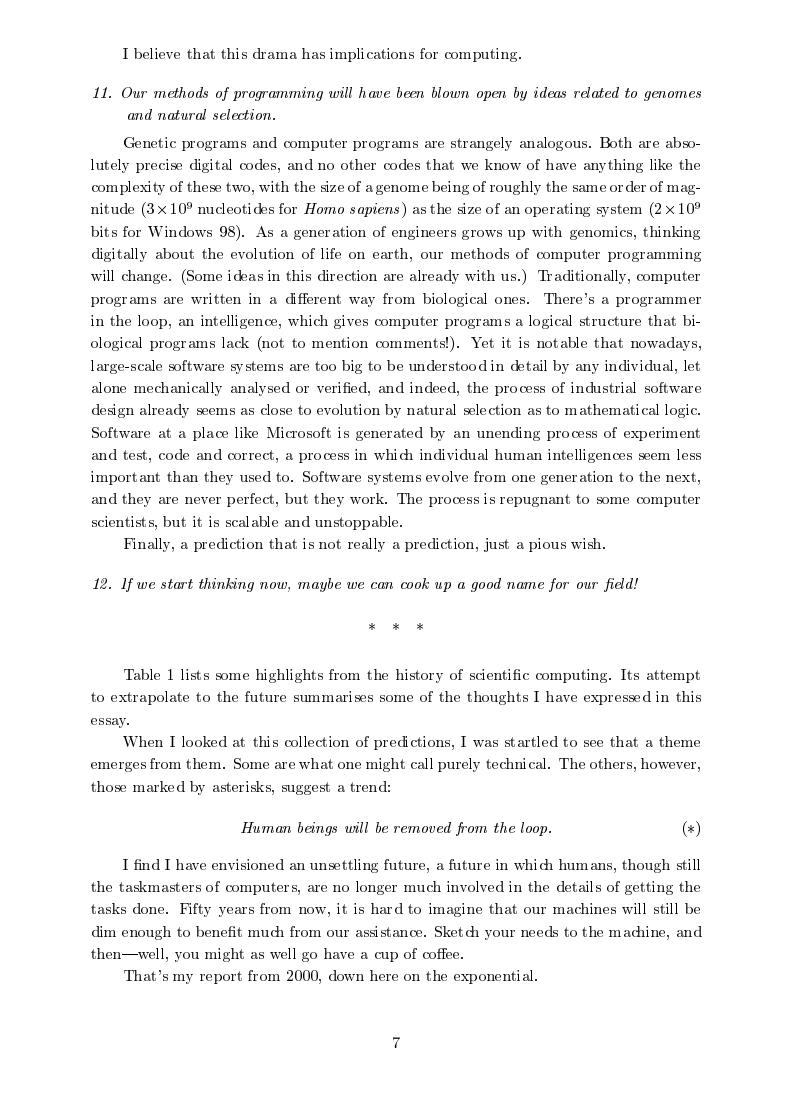正在加载图片...

I believe that this drama has implications for computing. 11.Our methods of programming will have been blown open by ideas related to genomes and natural selection. Genetic programs and computer programs are strangely analogous.Both are abso- lutely precise digital oodes,and no other codes that we know of have anything like the complexity of these two,with the sizeof agenome being of roughly the sameorder of mag nitude(3×10°nucleotides for Homo sapiens)as the size of an operating system(2×l0 bits for Windows 98).As a generation of engineers grows up with genomics,thinking digitally about the evolution of life on earth,our methods of computer programming will change.(Some ideas in this direction are already with us.Traditionally,computer programs are written in a different way from biological ones.There's a programmer in the loop,an intelligence,which gives computer programs a logical structure that bi- ological programs lack (not to mention comments!).Yet it is notable that nowadays large-scale software sy stems are too big to be understood in detail by any individual,let alone mechanically analysed or verified,and indeed,the process of industrial software design already seems as dlose to evolution by natural selection as to mathematical logic Software at a place like Microsoft is generated by an unending process of experiment import ant than they used to.Software systems evolve from one generation to the next, and they are never perfect,but they work.The process is repugnant to some computer scientists,but it is scalable and unstoppable Finally,a prediction that is not really a prediction,just a pious wish. 12.If we start thinking now,maybe we can cook up a good name for our field! Table 1 lists some highlights from the history of scientific computing.Its attempt to extrapolate to the future summarises some of the thoughts I have expressed in this essay. When I looked at this collection of predctions.I was startled to see that a theme emerges from them.Some are what one might call purely technical.The others,however, those marked by asterisks,suggest a trend: Human beings will be removed from the loop () I find I have envisioned an unsettling future,a future in which humans,though still the taskmasters of computers,are no longer much involved in the details of getting the tasks done.Fifty years from now,it is hard to imagine that our machines will still be dim enough to benefit muc from our assistance.Sketch your needs to the machine,and then-well,you might as well go have a cup of coffee. That's my report from 2000,down here on the exponential.I believe that this drama has implications for computing
Our methods of programming wil l have been blown open by ideas related to genomes and natural selection
Genetic programs and computer programs are strangely analogous Both are abso lutely precise digital codes and no other codes that we know of have anything like the complexity of these two with the size of a genome being of roughly the same order of mag nitude nucleotides for Homo sapiens as the size of an operating system bits for Windows As a generation of engineers grows up with genomics thinking digitally about the evolution of life on earth our methods of computer programming will change Some ideas in this direction are already with us Traditionally computer programs are written in a di
erent way from biological ones There s a programmer in the loop an intelligence which gives computer programs a logical structure that bi ological programs lack not to mention comments Yet it is notable that nowadays large scale software systems are too big to be understood in detail by any individual let alone mechanically analysed or veried and indeed the process of industrial software design already seems as close to evolution by natural selection as to mathematical logic Software at a place like Microsoft is generated by an unending process of experiment and test code and correct a process in which individual human intelligences seem less important than they used to Software systems evolve from one generation to the next and they are never perfect but they work The process is repugnant to some computer scientists but it is scalable and unstoppable Finally a prediction that is not really a prediction just a pious wish
If we start thinking now maybe we can cook up a good name for our eld Table lists some highlights from the history of scientic computing Its attempt to extrapolate to the future summarises some of the thoughts I have expressed in this essayWhen I looked at this collection of predictions I was startled to see that a theme emerges from them Some are what one might call purely technical The others however those marked by asterisks suggest a trend Human beings wil l be removed from the loop
I nd I have envisioned an unsettling future a future in which humans though still the taskmasters of computers are no longer much involved in the details of getting the tasks done Fifty years from now it is hard to imagine that our machines will still be dim enough to benet much from our assistance Sketch your needs to the machine and thenwell you might as well go have a cup of co
ee That s my report from down here on the exponential
�������������������������������������